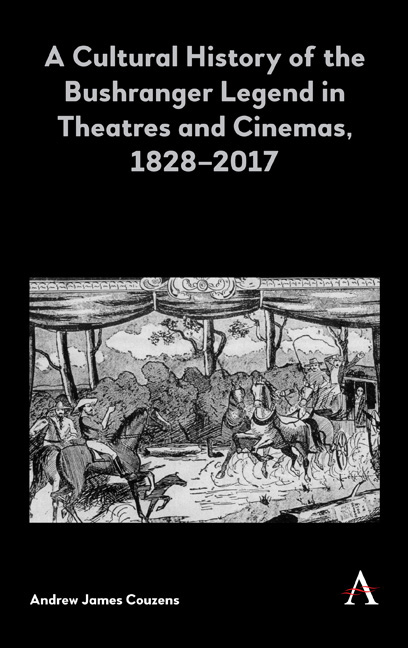Book contents
- Frontmatter
- Contents
- List of Figures
- Acknowledgements
- Introduction: Defining the Bushranger Legend
- Part 1 Establishing the Legend
- Part 2 Developing the Legend
- Part 3 Fragmenting the Legend
- 9 Historical Revisionism and the Bushranger Legend
- 10 Diversification and Inclusiveness of the Bushranger Legend
- 11 Globalization of the Bushranger Legend in Outlaw Road Movies
- Conclusion
- Bibliography
- Index
9 - Historical Revisionism and the Bushranger Legend
from Part 3 - Fragmenting the Legend
Published online by Cambridge University Press: 14 February 2019
- Frontmatter
- Contents
- List of Figures
- Acknowledgements
- Introduction: Defining the Bushranger Legend
- Part 1 Establishing the Legend
- Part 2 Developing the Legend
- Part 3 Fragmenting the Legend
- 9 Historical Revisionism and the Bushranger Legend
- 10 Diversification and Inclusiveness of the Bushranger Legend
- 11 Globalization of the Bushranger Legend in Outlaw Road Movies
- Conclusion
- Bibliography
- Index
Summary
The 1988 Bicentenary commemorated 200 years of history following the arrival of the First Fleet to Australia in 1788. By nature, the event foregrounded Australia's settler history, reinforcing those myths of national origins represented by Australia's British heritage as well as those of the radical nationalists. Controversy and criticism precipitated a variety of changes to the planning for the event. The Australian Bicentennial Authority found itself the target of sustained criticism as numerous political interests sought representation for their vision of Australia. The Authority initially implemented a policy of debate and inclusivity for the Bicentenary reflecting the multiculturalist agenda that immigration following the Vietnam War had necessitated. They embodied this approach in the inclusive official slogan ‘Living Together’. However, it was not long before Prime Minister Malcolm Fraser, disapproving of the slogan's perceived insipidness, replaced it with ‘The Australian Achievement’, which reflected a triumphalist approach to the nation. Bob Hawke's Labor government changed the slogan back when they ousted the Fraser government in the 1983 election. Hawke's rationale was to make the Bicentenary as inclusive and controversy free as possible, and from this point, the Authority tended to try and please as wide a range of interests as possible, endorsing any suggested events that did not seem to court controversy.
Yet even the Authority's aversion to controversy created controversy. The Authority rescinded their initial endorsement of a planned reenactment of the First Fleet's arrival in Sydney Harbour due to concerns over its perceived insensitivity towards Indigenous Australians aggrieved over the commemoration of a moment they considered to have robbed them of elements of their identity, land and culture. In response several conservative commentators mobilized media criticism of the decision and arranged a diminished, corporatized version of the reenactment.
The Bicentenary was an important moment in Australian cultural history that brought conversations about national inclusivity to the forefront and drew attention to the exclusive nature of some aspects of Australian nationhood, including the bushranger legend. The mechanisms described in the previous chapter legitimized bushrangers as representatives of a hegemonic bushoriented national character. In Australian cinema post- Bicentenary, representations of bushrangers therefore contributed to the conversation by undermining and subverting the ideological and political meanings of traditional bushrangers’ association with the nation. They did so through different representational strategies including the use of parody and revisionist western genre films.
- Type
- Chapter
- Information
- Publisher: Anthem PressPrint publication year: 2019



